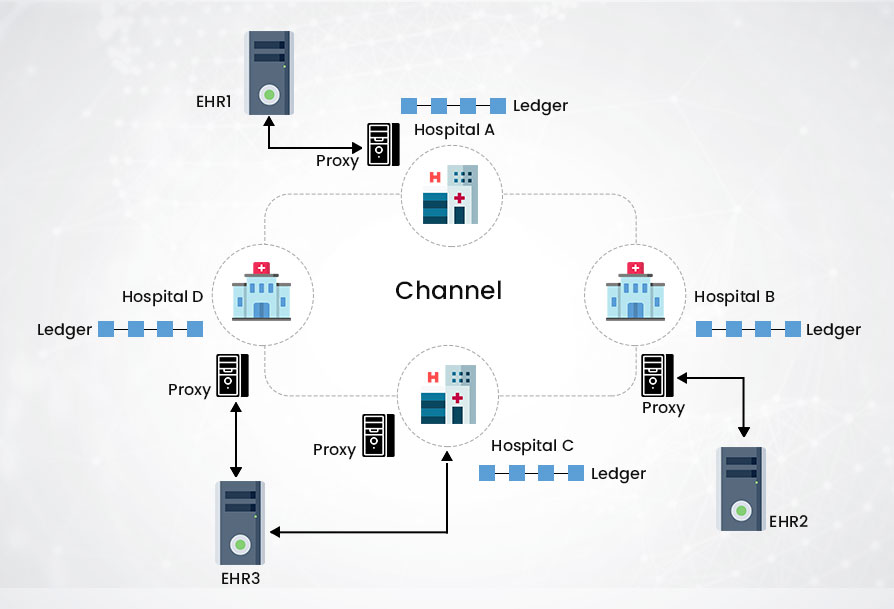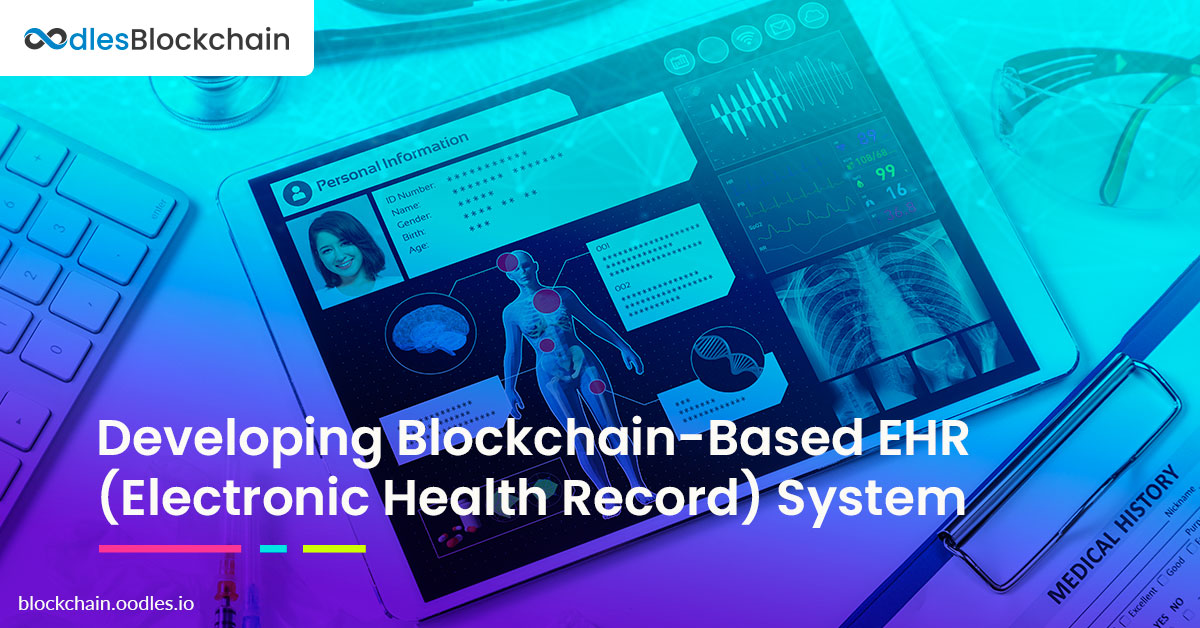-
The healthcare industry is at the cutting-edge of technology. The quality of patient care in 2019 has never been higher. However, the administration and data processing underlying the treatment is lagging far behind. Lack of interoperability with EHR is one of today's barriers to healthcare organizations. Open standards initiatives such as Fast Healthcare Interoperability Resources (FHIR) have begun to address these problems. However, they are not mature enough to completely support interoperability. Organizations are optimistic that blockchain healthcare solutions development can be the game-changer that will continue to bring interoperability.
What are the Challenges with EHRs
The Healthcare industry's one of the most pressing issues today is to share patients' medical data with stakeholders in a way that maintains data integrity and protects privacy.
Data standards are indeed better than they have ever been. EMRs can still collapse with inaccurate processes and a lack of accountability. It can lead to an impact on decision-making and data veracity, which, in turn, naturally impacts a patient's treatment and care.
Medical authorities now focus on coordinating care and involving the patient more in the processes. It requires stakeholders to be able to access, view, edit, and share data on EMRs at each treatment stage while preserving an accurate and up-to-date medication and diagnosis record.
What's the Solution
It may seem a simple logistics challenge. But without standardization of EMRs, and a medium to information exchange safely, it can be dangerous. If medical authorities leave electronic medical records incomplete or miss at a vital care stage, it can result in jeopardizing the effectiveness of a particular treatment course.
EMRs should be structurally sound. It must give patients the provision to have a say in who can access their information, how much part of it someone should access, and what activities they can (and cannot) perform using their PHI.
Introducing Blockchain for EMRs Management
It makes perfect sense to use blockchain, considering that PHI is sensitive and subject to the issues discussed earlier. When contained within an EMR and shared on a distributed blockchain ledger, information can be updated and secured and made ready for use by anyone authorized to access it. A blockchain-based EMR solution time-consumption to access information about a patient. It will also augment the quality of the data and ensure smooth and secure interoperability.
Subsequently, blockchain for EHRs (electronic health records) can lead to reduced overheads. It will happen during the development of software and maintenance of health record systems.
Also, Read | Augmenting the Management of EHRs (Electronic Health Records) with Blockchain
What are the Advantages of Blockchain for EHRs
Upon the introduction of a blockchain to manage EHRs, it becomes the long-awaited standardized method of digital health data management. Healthcare stakeholders will not need access to patient data through specific software or databases.
For example, the decentralized blockchain would enable doctors, nurses, administrators, and other approved individuals to participate in an exchange community. It will eliminate their need to rely on a private network between local hospitals (or a state-designated HIE) and additional data exchange infrastructure between organizations. Moreover, in the interests of collecting statistics, understanding trends, and improving patient care, EHR metadata could be shared safely and securely. That leads us to maybe the most interesting EMR and blockchain use case.
Secure, Efficient, and Real-Time EHR Management
In the healthcare industry, streamlined, accurate, real-time sharing of information should be considered the gold standard for both providers and patients. Security concerns and regulatory requirements, however, often prevent the sharing of quality data between organizations and individuals. A better level of collaboration can promote more efficient treatment and enhance options for treatment, introducing an era of cost-efficient, appropriate medical care. It is where blockchain happens to come in. It can thwart the data ownership issues and generate safe and responsible peer-to-peer sharing without letting the patient out of the cycle.
Augmenting Clinical Research and Telemedicine
In the US, the Health Insurance Portability and Accountability Act ( HIPAA) rendered the use of healthcare data challenging and inhibited its real-time use.
With blockchain for EHRs, health data can be collected, stored, secured, and shared, while also allowing for real-time use. It might also result in a selection of anonymized patient records for studies by healthcare professionals and researchers. It can lead to an increase in tests and a deeper understanding of symptoms and treatment options.
With additional data generated from wearables and mobile apps, blockchain-based EMR can also deliver tailored patient health recommendations through an app or email. It can enable a doctor to check the recovery of a patient from surgery or illness in real-time. Identifying problems relating to diet and exercise, and vital signs like heart rate, without the need for face-to-face consultation, can become possible.

Also, Read | Healthcare Insurance on Blockchain with Smart Contracts
Developing a Hypothetical System with Hyperledger Fabric
We design a hypothetical system for interoperability, data security, traceability, and system accessibility following the Health Insurance Portability and Accountability Act (HIPAA) technical safeguard and ISO / TS 18308. We adopt the Hyperledger Fabric (HLF) platform to achieve our goals. In the system, various hospitals will establish a consortium with a private peer-to-peer network. With consensus among the members, membership permission will be determined.
Hyperledger blockchain development is open-source. It offers many components in programming languages. Also, it provides the Byzantine consensus tolerant fault method for transaction ordering to a block. Also, it enables 3,500 transactions per second. The Linux Foundation has hosted it, and Digital Asset and IBM contribute to the project.
The system will come with three main features:-
- A reliable registry of PHI in EHRs that ensures access as well as data integrity
- Reinforced security patient data management using an encryption scheme and a transparent and indisputable audit trail depending on an immutable access log.
- Extensibility to include various existing regional or core hospital EHRs with minimal system modification and availability.
Use Case Scenario
We simulate a use case that explains a hands-on situation. We assume a patient, Alice, visits Hospital A. Alice finds that she has cancer. Dr. John recommends that she must see a cancer expert in the central hospital. Dr. John uploads records of Alice to the hospital's EHR with her consent. Then, Alice goes to the central hospital, and the cancer specialist accesses Hospital A's data for Alice in the EHR.
Also, Read | Secure and Efficient Healthcare Data Sharing (POC) using Corda Blockchain
Conclusion
Most forward-thinking healthcare organizations have already started acknowledging the potential of blockchain technology. It is because they believe it can transform the way they operate at the most fundamental level.
More importantly, using blockchain to standardize the way stakeholders manage and access electronic medical records will elevate patient care. Patients will get more accurate diagnoses, fatal errors will get reduced, and they will be in control of their digital health record as a whole. Further, safely reconciled electronic health metadata can be put to work. It can help in identifying health trends and improving treatment.
The potential of blockchain technology is incredible and thought-provoking. Combining blockchain with EMR can ensure a brighter, fairer, healthier future for all of us. For more information about developing a blockchain solution for EHRs, connect with our blockchain experts.

Our Offices
INDIA
Emaar Digital Greens, Sector 61,
Gurugram, Haryana
122011.
Welldone Tech Park,
Sector 48, Sohna road,
Gurugram, Haryana
122018.














